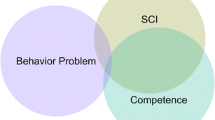Abstract
This research was designed to compare early patterns of cognitive and social development in young children from families with and without a bipolar parent. 27 children (seven probands and 20 controls) were followed longitudinally during the second and third years of life. They were administered normed infant tests to assess physical object permanence, self-recognition, social role-taking, and attachment to the caregiver. There were no deficits in the performance of children from bipolar families on the cognitive tests. In contrast, on assessments that involved social relations, either with other persons or with symbolic representations of others, there were significant disturbances. Children with a bipolar parent showed developmental deficits in taking another's perspective and they displayed insecure patterns of attachment.
Similar content being viewed by others
References
Davenport YB, Adland ML, Gold PW, et al: Manic-depressive illness: Psychodynamic features of multigenerational families.Am J Orthopsychiat. 49:24–35, 1979.
Cohen MB, Baker G, Cohen RA and Wiegert E: An intensive study of twelve cases of manic-depressive psychosis.Psychiatry. 17:103–107, 1954.
Bowlby L:Attachment and Loss: Loss, Sadness and Depression, vol. III. New York: Basic Books, 1980.
Anthony EJ: The influence of a manic-depressive environment of the developing child, in Anthony EJ, Benedek T (eds.).Depression and Human Existence. Boston: Little, Brown & Co, 1975.
Mahler MS, Pine F and Bergman A:The Psychological Birth of the Human Infant: Symbiosis and Individuation. New York: Basic Books, 1975.
Cowan PA:Piaget with Feeling: Cognitive, Social and Emotional Dimensions. New York: Holt, Rinehart, & Winston. 1978.
Damon W: Five questions for research in social-cognitive development. in Higgins ET, Ruble N and Hartup WW (eds.).Social Cognition and Social Development. Cambridge: University Press, pp 371–393, 1983.
Watson MW and Fischer KW: A developmental sequence of agent use in late infancy.Child Dev. 48:828–836, 1977.
Bertenthal BI and Fischer KW: The development of self-recognition in the infant.Dev. Psychol 14:44–50, 1978.
Uzgiris IC and Hunt JMc:Assessment in Infancy. Urbana, Illionis: University of Illinois Press, 1975.
Ainsworth MDS, Blehar MC, Waters E et al:Patterns of Attachment: A Psychological Study of the Strange Situation. Hillsdale, New Jersey: Erlbaum, 1978.
Spitzer RL and Endicott J: Schedule for affective disorders and schizophrenia: Life-time version, inBiometrics Research, New York: New York State Psychiatric Institute, 1978.
Mazure C, Gershon ES: Blindness and reliability in lifetime psychiatric diagnosis.Arch Gen Psychiatry.36:521–525, 1979.
Gallup GG Jr: Chimpanzees: self recognition.Science. 167:86–87, 1970.
Piaget J:The Construction of Reality in the Child. New York: Basic Books, 1954.
Cummings EM and Bjork EL: Search behavior in multi-choice hiding task. Evidence for an objective conception of space in infancy.Int J Beh Dev. 6:71–87, 1983.
Gaensbauer TJ, Harmon RJ, Cytryn L and McKnew DH: Social and affective development in infants with a manic-depressive parent.American J Psychiatry.141:223–229, 1984.
Zahn-Waxler C, Cummings EM, McKnew DH and Radke-Yarrow M: Altruism, aggression and social interactions in young children with a manic-depressive parent.Child Development. 55:112–122, 1984.
Davenport YB, Zahn-Waxler C, Adland ML and Mayfield A: Early child-rearing paractices in families with a manic-depressive parent.American J Psychiatry.14:230–235, 1984.
Garmezy N: Children at risk. The search for the antecedents of schizophrenia. Part I.Schizophr Bull. 8:14–91, 1974.
Garmezy N: The search for the antecedents of schizophrenia. Part II.Schizophr Bull.8:55–126, 1974.
Author information
Authors and Affiliations
Additional information
National Institute of Mental Health
We would like to thank Geri Cooperman, Rita Dettmers, Christine Grewell, Anne Mayfield, and Jean Welsh for their assistance on this project.
Rights and permissions
About this article
Cite this article
Zahn-Waxler, C., Chapman, M. & Cummings, E.M. Cognitive and social development in infants and toddlers with a bipolar parent. Child Psych Hum Dev 15, 75–85 (1984). https://doi.org/10.1007/BF00706165
Issue Date:
DOI: https://doi.org/10.1007/BF00706165




